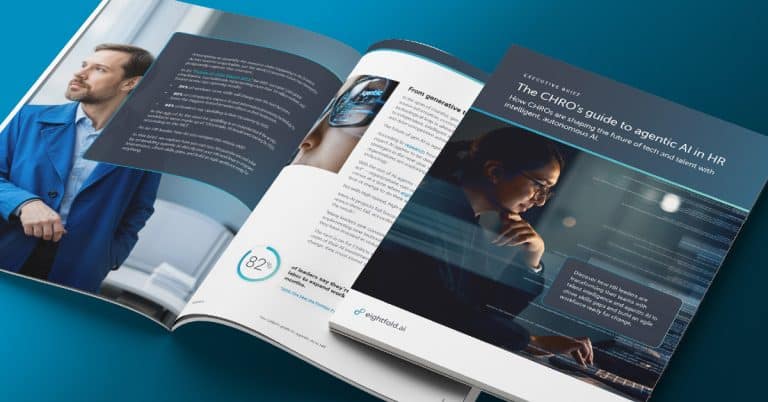
The CHRO’s guide to agentic AI in HR
The CHRO’s guide to agentic AI in HR
CHROs are at the forefront of a world of work undergoing massive transformation. The race for reinvention is on.
Forward-thinking HR leaders are embedding agentic AI into their talent strategies to close skills gaps, scale hiring operations, and prepare for the future of work.
Learn how talent intelligence platforms powered by agentic AI can help you move beyond manual tasks to strategic impact — transforming high-volume hiring from a bottleneck into a competitive advantage while giving your team the superpowers they need to thrive in an AI-first era.
In this brief, you’ll learn:
- How to distinguish true agentic AI from traditional automation.
- Why high-volume hiring is the ideal proving ground for AI transformation.
- How AI Interviewer delivers 30-40% faster time to hire while improving quality.
- The strategic advantages CHROs gain by leading AI adoption in HR.
Attempting to quantify the massive shifts happening in the business world may seem impossible, yet the World Economic Forum has managed to poignantly capture this moment.
In its “Future of Jobs Report 2025,” the WEF surveyed 1,000 global employers, cumulatively representing more than 14 million workers, and found some eye-opening results:
- 39% of workers’ core skills will change over the next five years.
- 86% of companies expect AI and information processing technology to have the biggest transformative effect on their businesses.
- 85% of leaders say upskilling is their top priority by 2030.
In the age of AI, the need for upskilling is so essential that if the world’s workforce were made up of 100 people, 59 would need training by 2030.
training by 2030. As an HR leader, how do you navigate this seismic shift?
In this brief, we explore how you can turn AI’s promise into real value by embedding agentic AI directly into your HR workflows to empower teammates, close skills gaps, and build an agile workforce ready for anything.
From generative to agentic AI
In the span of months, gen AI has transformed how we work: how we source information, communicate, code, and so much more. The next technological leap is already here — a shift from reactive, prompted tools to independent, intelligent agents that boost productivity, reduce costs, and drive competitive advantage.
The future of gen AI is agentic AI.
According to research from Microsoft, the majority of leaders (81%) expect AI agents to be deeply integrated into their company’s AI strategies in the next year and a half. And KPMG reports that the majority of organizations are moving beyond pilots with 90% past experimenting with AI agents, and 33% achieving some kind of deployment with agents.
With the rise of AI agents — digital workers that can “reason, plan, and act” — organizations can now effortlessly scale their workforces. This comes at a time when eight out of 10 workers report not having enough time or energy to do their work. Digital workers will bridge that gap.
But with high-speed, high-stakes transformations, there’s always risk.
82% of leaders say they’re confident that they’ll use digital labor to expand workforce capacity in the next 12–18 months. – “2025: The Year the Frontier Firm Is Born,” Microsoft
Many AI projects fail because organizations lack the right skills. Another reason these fail, according to Deloitte, is unrealistic business use cases. The result?
“Many leaders sink considerable time and capital into buying and implementing new technologies, only to change direction later or realize they have invested in redundant technologies.”
The race is on for CHROs to adopt agentic AI. But for CHROs to make the most of their AI investments and build an agile workforce ready to tackle change, they must invest strategically.
The cost of getting agentic AI wrong
Before investing in agentic AI, it’s critical to vet vendors and ask questions to ensure you’re purchasing a true agent. Failure to differentiate between true agentic AI and false agents could lead to:
- Systems that require constant oversight and reconfiguration.
- Escalating costs from inefficiencies, redundant work, and continuous patching.
- Losing trust from systems that overpromise and underdeliver.
- Security and compliance gaps from mishandled sensitive data.
- Falling behind as competitors deploy adaptive, self-improving systems.
You might also like...
Get the latest talent news in your inbox every month
By submitting this form, I consent to Eightfold processing my personal data in accordance with its Privacy Notice and agree to receive marketing emails from Eightfold about its products and events. I acknowledge that I can unsubscribe or update my preferences at any time.
